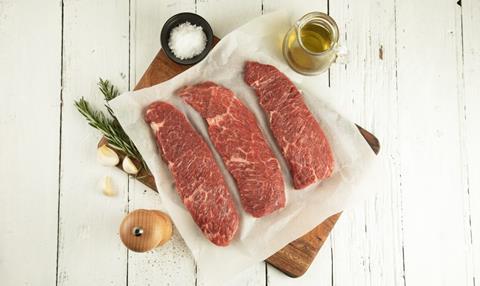Quality Meat Scotland (QMS) has looked at the findings of a review published in the American Journal of Clinical Nutrition, which reported that switching to plant-based diets appears to "put us at risk of nutrient deficiencies".

QMS highlighted that the authors of 'Impact of consuming an environmentally protective diet on micronutrients: a systematic literature review' said: "We found evidence that diets aiming to reduce environmental impact can result in lower intakes and status of key micronutrients."
Looking at this in the context of red meat, the trade body highlighted that pork contains 10 vitamins and minerals at "significant levels" and said that the meat was "rich in high quality protein". It also referred to lamb and beef as "similar nutrition superheroes".
QMS maintained that "a typical meat-free meal has a lower protein quality than animal foods", and said that despite lower intake of nutrients like vitamin B12, vitamin D, zinc and iodine, plant foods are rich in fibre, vitamin C and polyphenols, stating that they are "still vital to include in the daily diet".

The nutritional content of red meat was explored in another paper published in the journal, 'Animal board invited review: The contribution of red meat to adult nutrition and health beyond protein'.
Lead author of the review and QMS board member, dietitian Dr Carrie Ruxton, said: "Red meat has been eaten by humans for tens of thousands of years and the reason is because it is a very nutrient-dense food, containing most of the nutrients we need for growth and repair. Not only this, some of the minerals in red meat, such as iron and zinc, are in a format that's better absorbed by the human body compared with plant or fortification sources."
The review looked at the benefits and risks of eating meat versus avoiding it, reportedly finding that moderate intakes of red meat provide far more benefits than risks.
Ruxton continued: "Studies which link high meat intakes with health conditions, like bowel cancer, take a snapshot of diet in thousands of people with a myriad of lifestyle habits. But a major problem with these 'observational studies' is that they don't prove cause and effect. What we do know is that people can keep in good health by sticking with a moderate amount of meat - that's five weekly servings around the size of a deck of cards."
Meat-free dietary risks
The review reported that the risks of meat-free diets were only just being recognised. It said that meat-free diets may cause low intakes of nutrients, particularly vitamin B12, zinc and iron, a higher risk of bone fractures and lower protection for muscle tissue.
QMS highlighted that one study within the review tracked people's health for 18 years, finding that meat eaters had a "significantly lower risk of hip fracture compared with groups that avoided meat". Another study found that animal proteins are "more effective for building and maintaining muscles" compared with plant proteins, with QMS stating that this was relevant to older adults "where long-term loss of muscle mass can lead to frailty and even falls".
The trade body referred to a YouGov poll which claimed that "the proportion of UK adults following vegan diets flatlined at 2-3%", saying that meat and dairy foods continued "to be important foods". QMS said that according to another study, "most people prefer the flavour and mouthfeel of real meat compared with plant-based alternatives", leading to cultured animal fats being added to plant-based products to "mimic the taste of meat".
Responding to this, QMS said: "Not only is this likely to be unacceptable to vegans, since lab-grown products need to use starter cultures made from animal cells, but it seems bizarre to have to add animal flavours to make plant foods acceptable. Why not simply enjoy eating a serving of lean red meat in a healthy balanced diet?"
It went on to say that with the "growing opposition to ultra-processed foods", there may be more people returning to "omnivorous diets".
This story was originally published on a previous version of the Meat Management website and so there may be some missing images and formatting issues.















